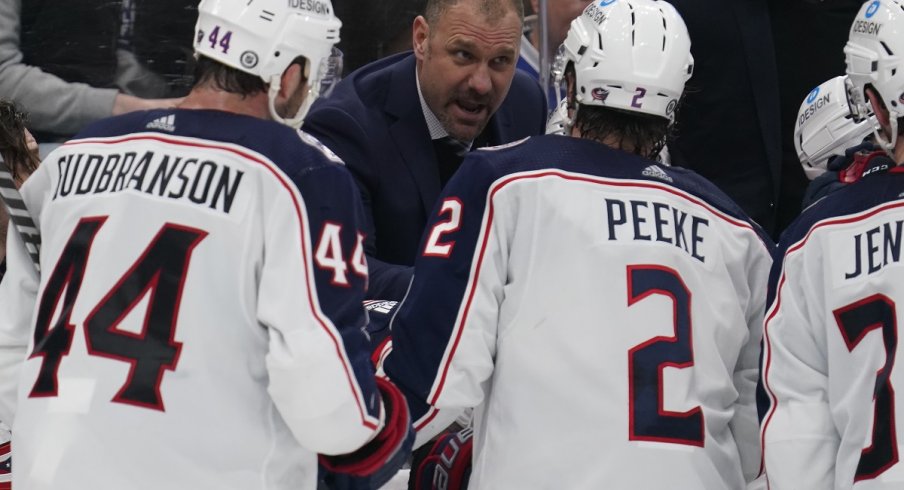After just two seasons, the Columbus Blue Jackets made the decision to move on from Brad Larsen, as the head coach was let go from his position the morning after the regular season ended.
Larsen's rise from AHL assistant coach to NHL bench boss was steady and methodical. He joined the organization in 2010-11 having just retired from playing in the AHL after a rugged professional playing career that spanned from 1997-98 through 2009-10. After just two seasons as an assistant coach, he was elevated to the head coaching job in Springfield (then the organization's AHL affiliate). He took his team to the playoffs in two consecutive seasons, then was promoted again in 2014-15 to be an NHL assistant. He served as Todd Richards' assistant for the next season and change, until John Tortorella took over the helm after an 0-7-0-0 start. He stayed under Tortorella's tutelage throughout the duration of his tenure with the club. Then, after the organization and Tortorella parted ways after his contract ended, the Blue Jackets did the easy thing - hired from within after the organization conducted an "exhaustive process" of evaluating all coaching options.
Hindsight is always 20/20, but perhaps it shouldn't be a surprise that the best person to lead the franchise forward wasn't already conveniently on the payroll. Larsen finished 62-86-16 in two seasons, a lowly .427 point percentage.
Of course, while it's easy to pile on Larsen now, even a few days of hindsight is enough to allow that the deck was in some ways stacked against him. For starters, the injuries his teams suffered were ruinous, and perhaps even the best coaches in the NHL would have succumbed to the losing and turmoil that was prevalent this year. For as bad as the club's record was this year, Larsen deserves credit for getting his team to play hard, even if the results weren't all that strong even when his team was healthy (at the beginning of this season and during last season).
Second, the first-time head coach, who was 43 when he was promoted, didn't have a well-tenured assistant he could lean on. All due respect to Steve McCarthy, Kenny McCudden, and Pascal Vincent, but none of them are the sage, experienced and authoritative voices that have led their respective teams to Stanley Cups in the past.
But perhaps the most glaring reason that the Larsen experiment failed was that he was unable to thread the needle of being a Tortorella disciple without the bite required to be, well, Tortorella. After his hiring, Larsen talked about how he would take some lessons from his predecessor but that, at the end of the day, he would be his own man. That never really happened. Zach Werenski, who has been with Larsen for the duration of his career, said the quiet thing out loud when discussing the dreaded "C" word, culture:
“I don’t want to say the culture wasn’t good at all, because it was, and we have a close group in there. But just in terms of the standard. We have to set the standard higher, and we have to let the young guys know that this isn’t acceptable. We know it’s not acceptable. We’ve been on winning teams. We have to get our standard back, and it starts with (the veteran players).”
Larsen, who made his living while playing pro hockey as a grinder, struggled to establish an identity the way that successful coaches seem to do. Was he a player's coach that inspired his troops to great heights? Was he elite at developing young talent? Was he a superb tactical mind that could remedy a power play or stymie an opposing team's breakout with a suffocating neutral zone forecheck? Unable to differentiate himself as anything other than a seemingly genuinely good guy with a work ethic, Larsen became an easy scapegoat for a bad and battered Blue Jackets team.
When the Blue Jackets promoted Larsen two seasons ago, they - both literally and figuratively - got what they paid for. It was time to turn the page from the Tortorella era, and Larsen was put in a difficult position to bridge the gap from a roster that had been to the playoffs in four of the previous five years to the next generation. He almost got to see it through.
